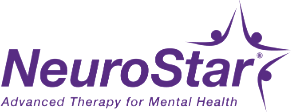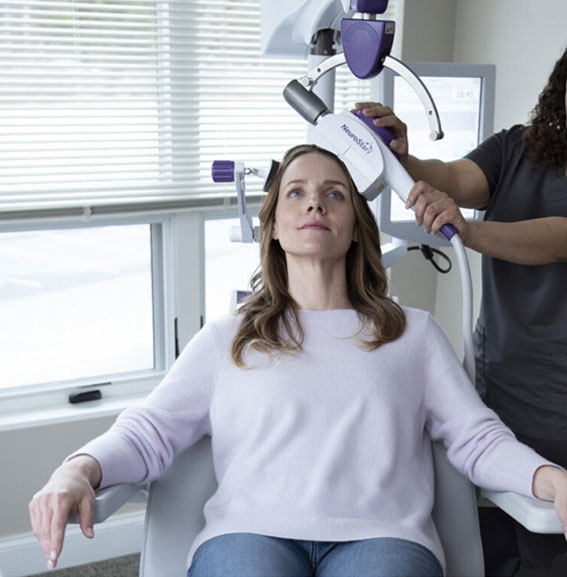
TMS is now FDA-cleared for adult and adolescent depression ages 15 and up. TMS Therapy is covered by most insurance and is a non drug treatment for mental health.

Live a life free of depression and OCD with NeuroStar Advanced TMS Therapy in Lanham.
If you are struggling to manage your mental health with medication or psychotherapy, Access Health Services offers NeuroStar Advanced Transcranial Magnetic Stimulation (TMS) therapy for qualifying patients. NeuroStar is a leading-edge, non-invasive TMS treatment designed to help patients who are struggling with clinical depression, OCD, and anxious depression. As the #1 doctor-recommended TMS therapy, NeuroStar is one of the best treatments of its kind. It can be especially beneficial if you have not found relief through traditional medications or psychotherapy.
NeuroStar Delivers Proven Results for Adolescents and Adults.
This PET scan highlights the difference in brain activity between a healthy individual and someone with depression. NeuroStar TMS Therapy targets these underactive regions with magnetic pulses, restoring healthy brain function. Backed by clinical research, NeuroStar has helped over 83% of patients experience significant relief from depressive symptoms.
Sackeim HA, et al. (2020). J Affective Disorders, 277(12):65-74

Before Treatment
You’ll recline comfortably in the treatment chair. A small, curved magnetic coil will be positioned lightly on your head.
During Treatment
NeuroStar delivers focused magnetic stimulation directly to the target areas of the brain. You’ll hear a clicking sound and feel a tapping sensation on your head.
After Treatment
Each treatment typically takes 19 minutes. You can resume normal activities immediately. TMS has not shown to have any affects on cognition, so you can drive yourself to and from treatment sessions.

The science behind NeuroStar TMS therapy is grounded in a deep understanding of how mental health disorders such as depression, OCD, and anxious depression affect your brain.
These conditions—along with many other mental health disorders—often stem from reduced brain activity in regions that control your mood, emotion, and behavior. When your brain activity is lower in these key areas, it can contribute to the challenging symptoms associated with these mental health issues, which may be difficult to manage with medication alone.
NeuroStar works by stimulating these specific brain regions, enhancing your brain’s natural ability to regulate your mood and emotions. Over time, this stimulation helps your brain improve its function independently, supporting you in managing your mental health symptoms more effectively.
One of the many reasons our patients prefer NeuroStar is because it requires no anesthesia. Throughout your appointments, you remain fully awake and comfortable. After each session, you can immediately return to your daily activities without any downtime. Whether it is work, social engagements, or other aspects of your routine, you do not need to pause your life as you recover from your mental health condition.

NeuroStar TMS Therapy Benefits
Thanks to the robust body of clinical evidence supporting its efficacy and long-lasting results, NeuroStar is the top TMS treatment recommended by physicians for depression, depression with anxiety, and OCD. What sets NeuroStar apart from other treatments and competing TMS therapies?
Lanham TMS Therapy FAQ
Am I a Good Candidate for TMS Therapy?
If you are an adolescent (15-21) with MDD or an adult with MDD, OCD, or anxious depression and tried numerous medications to manage your condition without success, NeuroStar could be a game-changer for you. Additionally, if you are looking for a non-invasive alternative to traditional treatments or seeking long-lasting relief without the hassle of daily medication, TMS therapy in may be a good treatment option for you to consider.
TMS Patient Testimonials
Adult Indications for Use
The NeuroStar Advanced Therapy System is indicated for the treatment of depressive episodes and for decreasing anxiety symptoms for those who may exhibit comorbid anxiety symptoms in adult patients suffering from Major Depressive Disorder (MDD) and who failed to achieve satisfactory improvement from previous antidepressant medication treatment in the current episode. The NeuroStar Advanced Therapy System is intended to be used as an adjunct for the treatment of adult patients suffering from Obsessive Compulsive Disorder (OCD).
Adolescent Indications for Use
NeuroStar Advanced Therapy is indicated as an adjunct for the treatment of Major Depressive Disorder (MDD) in adolescent patients (15-21).
Important Safety Information
NeuroStar Advanced Therapy is only available by prescription. A doctor can help decide if NeuroStar Advanced Therapy is right for you. Patients’ results may vary. The most common side effect is pain or discomfort at or near the treatment site. These events are transient; they occur during the TMS treatment course and do not occur for most patients after the first week of treatment. There is a rare risk of seizure associated with the use of TMS therapy (<0.1% per patient). Visit neurostar.com for full safety and prescribing information.






